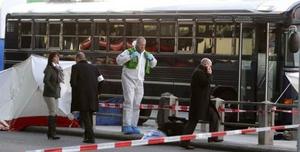Aviation securityAttack in German airport reveals airport security gaps
The second terrorist attack at an international airport in two months has further revealed gaps in airport security; a gunman boarded a U.S Air Force bus at Germany’s busy Frankfurt International airport and killed two airmen and injured two others; following 9/11, governments have primarily focused their efforts on screening passengers and bags, and largely left baggage claim areas, ticketing booths, and parking lots unprotected; in the aftermath of the suicide bombing in Russia last month, the United States has begun to deploy “unpredictable” security measures throughout its airports; some security analysts are skeptical of these additional security measures believing that they are impractical and advocate for increased cooperation between TSA and local law enforcement

Investigators at scene of bus attack // Source: bossip.com
The second terrorist attack at an international airport in two months has further revealed gaps in airport security.
Last Wednesday 2 March 2011, a gunman boarded a bus filled with U.S. Air Force personnel bound for Afghanistan at Germany’s busy Frankfurt International airport and opened fire, killing two airmen and injuring two others before his gun jammed. According to Andrew Thomas, the editor of the Journal of Transportation Security, “[Wednesday’s] attack in Frankfurt revealed, the open area of the airports, whether parking areas, loading/unloading zones, and the terminals themselves, have historically been prime targets [for terrorists.]”
“There is no reason to believe that this won’t continue to be the case,” he added.
It is reported that Arid Uka, the gunman, had gone to the airport to specifically target Americans and that before opening fire he shouted “Allahu akbar.”
This recent attack follows the devastating suicide bombing in the baggage claim area of Moscow’s Domodedovo International airport that left thirty six people dead and more than one hundred injured.
Security officials say that these types of attacks reveal glaring weaknesses in airport security. Following 9/11, governments have primarily focused their efforts on screening passengers and bags, and largely left baggage claim areas, ticketing booths, and parking lots unprotected.
Fox News reports that the Transportation Security Administration (TSA), in the aftermath of the suicide bombing in Russia, has begun to deploy “unpredictable” security measures throughout airports in the United States.
In a written statement, the TSA said, “These measures include explosive detection technology, canine teams, behavior detection teams and Visible Intermodal Prevention and Response (VIPR) teams, among other measures both seen and unseen.”
Some security analysts are skeptical of these additional security measures believing that they are impractical.
Douglas Laird, president of Laird and Associates, an aviation security consulting firm, says that these proposed security precautions would create logistical nightmares. In particular, he says that screening vehicles before they enter airport terminals would be impossible.
He said, “For one thing, there’s not even room to do it. There’s not even room for the traffic backup.”
He dismissed efforts at airports in Tokyo and the Philippines that conduct such searches, saying, “You come up and you have to show your boarding pass. Does that make sense? I don’t know. A lot of that stuff is more for show and it doesn’t really accomplish anything.”
Instead, Laird recommends improving communication and cooperation between local law enforcement and TSA at terminals as an effective means of securing airports.
“At some airports, it’s very good,” he said. “And at some airports, it could be a lot better. It’s something that needs to be worked on.”
